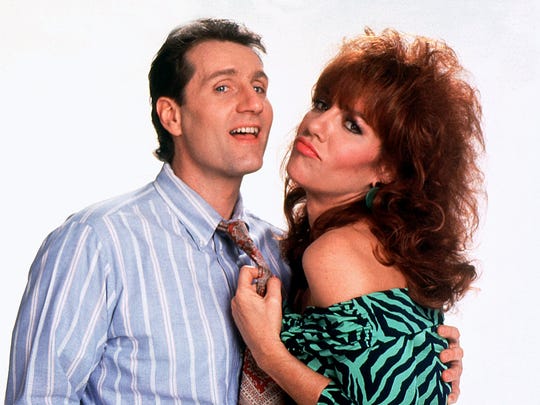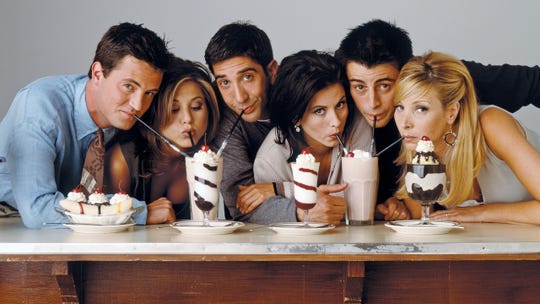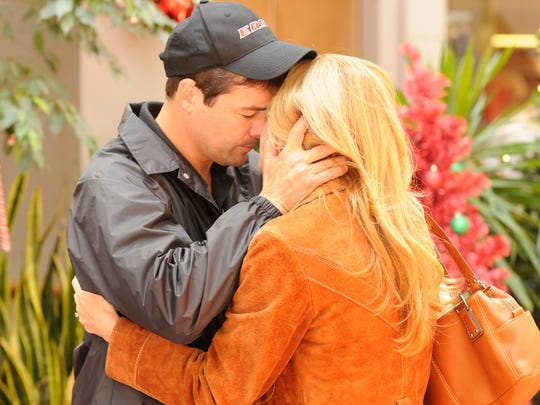You know the feeling. You’re watching one of your favorite TV shows from another decade, basking in the comfort of familiar faces and jokes and reminiscing about another time.
Then it happens.
A character makes an off-color remark that surprises you, and reminds you that the show isn’t as flawless as you remembered.
Racism, homophobia and transphobia have seeped into our cultural institutions, including television, since the beginning of time. But as the public becomes increasingly educated about the harms these practices have wrought, these problems become difficult for television viewers to ignore.
Some of our all-time favorite shows creep into this territory. We love these series, and we binge them again and again but there are jokes and moments that make us cringe in 2021.
Spring TV preview: 5 new TV shows worth your time, from ‘Aretha’ to ‘Shadow and Bone’
I Love Lucy (1951-1957)
Lucille Ball and real-life husband Desi Arnaz pioneered the situation comedy with this ‘50s story of domestic life. (Photo: AP)
Lucille Ball and real-life husband Desi Arnaz pioneered the situation comedy with this ‘50s story of domestic life. Lucy and her Cuban bandleader husband, Ricky, were a happy, humorously bickering couple and the series established a professional – and very funny – format for thousands of comedies that followed. However, Ricky’s demand that Lucy, a curious woman who wanted to perform in her husband’s act, remain a stay-at-home wife can make the blood boil today, even if that was accepted practice for many middle-class households of the time. That domestic situation became the template for many comedies that followed, including programs where men tried desperately to tamp down the powers of superior significant others (e.g., “I Dream of Jeannie” and “Bewitched”).
Fortunately, Lucy often ignored her husband’s instructions, resulting in hilarious employment as a Vitameatavegamin commercial pitchwoman; a vineyard grape stomper; and an assembly-line worker at a chocolate factory. The character’s independence – along with Ball’s skill at running a production company – sets a great example and her comedic ability produces the kind of laughter that counter the sharper, outdated edges. – Bill Keveney, television reporter
The Honeymooners (1955-1956)
Jackie Gleason portrays Ralph Kramden and co-star Audrey Meadows, Alice Kramden, in the tv series "The Honeymooners" in 1955. (Photo: CBS)
Believe it or not, domestic violence once got laughs on TV. One of the staples of this classic 1950s sitcom came when exasperated bus driver Ralph Kramden (Jackie Gleason), he of the comically volcanic temper, blew up at his wife, Alice (Audrey Meadows), offering such variations as “One of these days. Right in the kisser!,” as he punched one of his hands into the other, and, “You’re going to the moon!,” after he showed her his clenched fist.
Contemporary viewers may have been mollified by the fact that there was never any physical violence and that Alice, smarter and more capable than her husband, didn’t take the threats seriously, but it also reflected a more relaxed attitude toward domestic violence prevalent in that era. Today, it’s hard to imagine a physical threat being played for humor. As cringeworthy as elements of “The Honeymooners” and its contemporaries can be, they serve as valuable historical artifacts, helping us understand where we’ve been and how we’ve progressed – or haven’t. – Keveney
Star Trek (1966-1969)
Susan Demberg plays a mail order bride for Leonard Nimoy's character, Mr. Spock, in a scene from the television program, June 2, 1967 (Photo: AP Photo)
The first series in an epic science-fiction franchise, which aired from 1966 to 1969, was light years ahead of network competitors in so many respects, including a cast that was jaw-droppingly diverse for its time (and sadly, in many cases, for our time, too): An Asian man (George Takei), a Black woman (Nichelle Nichols) and a man who was half-human and half-Vulcan (Leonard Nimoy) were vital cogs in U.S.S. Enterprise leadership. At the same time, “Trek” could be benighted on matters of gender. The show’s final episode may be its worst: Dr. Janice Lester, one of a constellation of Captain Kirk’s ex-lovers (that’s another story), has a machine that lets her switch bodies with Kirk (William Shatner) so that she can finally become a Starship captain – a status somehow still denied women in the otherwise egalitarian 23rd Century! – Keveney
Married … With Children (1987-1997)
Although Al and Peg Bundy (Ed O’Neill and Katey Sagal) were the heads of a beloved 80s and 90s sitcom family, rewatching the series now lays bare the blatant misogyny of the show.
Although Al and Peg Bundy (Ed O’Neill and Katey Sagal) were the heads of a beloved ’80s and ’90s sitcom family, rewatching the series now lays bare the blatant misogyny of the show, something Sagal herself has spoken out about. “The women were portrayed completely exploited on that show. That was part of Al Bundy’s thing — he liked hot women, and they showed them all the time,” she said in 2017. – Kelly Lawler, TV critic
Interesting: Exclusive: Nielsen finds nostalgia fuels interest in classic TV comedies during pandemic
Friends (1994-2004)
The classic sitcom with an unforgettable theme song is one that has brought many of us laughs. But at whose expense? (Photo: WarnerMedia)
The classic sitcom with an unforgettable theme song is one that has brought many of us laughs. But at whose expense? Chandler Bing is mortified and even embarrassed almost any time his “gay dad,” (an inaccurate term he uses for a trans woman) is mentioned by any of his friends. And let’s not forget the constant misgendering.
In addition, Monica Geller is overtly fat-shamed throughout the series. Flashbacks from her high-school years as “Fat Monica” are dangerously stereotypical: simply because her character was overweight, she is depicted as a child-like “loner” and “loser” who isn’t invited to parties and hasn’t had sex. But her reputation suddenly changes when she drops the weight and becomes “cooler” and more attractive. – Jenna Ryu, Life intern
Sex and the City (1998-2004)
"Sex and the City" was revolutionary in the late ‘90s and early aughts. But there’s plenty to cringe at watching now. (Photo: SANTE D'ORAZIO, HBO)
The diverting HBO comedy was revolutionary in its depiction of sex-positive independent women, broaching conversations around infertility, breast cancer, orgasms and female masturbation that were still taboo on TV in the late ’90s and early aughts. But there’s also plenty to cringe at watching now.
The most egregious episode is Season 4’s “Coulda, Woulda, Shoulda,” in which Samantha picks a fight with three trans sex workers outside her apartment, whom Carrie refers to as “half-man, half-woman, totally annoying.” (Yikes.) Samantha eventually makes nice with the trio – who are also women of color – and the episode ends with them all snapping, laughing and dancing together, as Carrie exclaims, “I need to see you twirl, sista!” (Double yikes.) As the show readies for an HBO Max reboot, we hope they spend less on the Manolos and more on hiring a diverse writers’ room. – Patrick Ryan, entertainment reporter
‘Law and Order: SVU’ (1999-present)
There’s a lot that the "Law and Order" series has gotten wrong throughout the years. (Photo: Virginia Sherwood, NBC)
“SVU” has historically (mostly) attempted to serve as a progressive look at policing special victims cases and as a platform to talk realistically and candidly about the previously more taboo topics of sexual misconduct, assault and rape. Even through that lens, there’s a lot that the “Law and Order” series has gotten wrong throughout the years, specifically including episodes that deal with homophobia, the sexuality spectrum and police brutality. – Anika Reed,Life/Entertainment NOW editor
Gilmore Girls (2000-2007)
Some of the blink-and-you’ll-miss-them quips on "Gilmore Girls" serve as a good reminder for how far we’ve come. (Photo: Lance Steadler, The WB)
There’s no place quite like Stars Hollow. The music, the snow, the festivals and fast-paced talking plus all the coffee are enough to keep you coming back for more. But some of those quick-witted jokes are cringeworthy in 2021. Take the repeated mocking references to Michel and Taylor’s sexuality. And let’s not forget when Rory fat-shamed that ballerina – a plot that felt off even at the time. We’ll keep watching again and again to endlessly debate Jess versus Dean, Dean versus Logan … Jess versus Logan. But things look a bit different in today’s lens, and some of the blink-and-you’ll-miss-them quips serve as a good reminder for how far we’ve come. – Leora Arnowitz, senior editor, wellness, lifestyle and culture
‘Gilmore Girls’ turns 20: What I learned re-watching the beloved series as an adult
The Wire (2002-2008)
Racist and homophobic comments are abound in virtually every episode of HBO’s early aughts drug show “The Wire” from cops, politicians and gang members. (Photo: NIcole Rivelli, HBO)
Racist and homophobic comments are abound in virtually every episode of HBO’s early aughts drug show “The Wire” from cops, politicians and gang members. Constant homophobic slurs toward gay stick-up man Omar (Michael K. Williams) and racist jabs at the Black residents of Baltimore by officers who are supposed to police those same citizens feel especially upsetting. Even though it feels unfortunately authentic to the characters and the times, it’s cringeworthy upon a 2021 watch. – Reed
The L Word (2004-2009)
Marja-Lewis Ryan, Ilene Chaiken, Jennifer Beals and Katherine Moennig of "The L Word: Generation Q" speak during the Showtime segment of the 2019 Summer TCA Press Tour. (Photo: Amy Sussman/Getty Images)
Though groundbreaking and progressive for its time in terms of LGBTQ representation on TV, this early-2000s series about the lives and romances of a group of lesbian and queer friends in Los Angeles misses the mark in many of its jokes and plot lines – specifically, it has a biphobia and transphobia problem. Bisexuality, for example, is mocked as a lesser identity and characters become victims of harmful stereotypes of promiscuity and untrustworthiness. The show’s depiction of transgender people has also been criticized, so much so that extra care was taken in the 2019 reboot, “The L Word: Generation Q,” to bring proper representation to the screen with trans actors. A beloved show that recognized its past mistakes and worked to correct them for the next generation of viewers? We love to see it! – Sara Moniuszko, lifestyle and wellness reporter
How I Met Your Mother (2005-2014)
It's stunning that "How I Met Your Mother" got away with so much so recently and for nine seasons at that, even if it is a product of its time. (Photo: Dan MacMedan, USA TODAY)
The series’ chipper theme song wouldn’t make you think it was full of outdated themes and stories. But between transphobic jokes, the trivializing of Lily’s (Alyson Hannigan) attraction to Robin (Cobie Smulders) and Barney’s (Neil Patrick Harris) general misogyny – not to mention the “hot” and “crazy” scale for women – it’s hard to enjoy the hijinks on Ted’s (Josh Radnor) quest for his soulmate. It’s stunning that the show got away with so much so recently and for nine seasons at that, even if it is a product of its time. – David Oliver, entertainment reporter
Hollywood’s casting dilemma: Should straight, cisgender actors play LGBTQ characters?
Friday Night Lights (2006-2011)
A recent "Friday Night Lights" binge indicated quite a few problematic elements that wouldn't scream "touchdown" in today's television landscape – and probably shouldn't have then.
“Clear eyes, full hearts, can’t lose” and “Texas forever” are classic lines we’ll never forget because of this heartwarming, under-appreciated football-but-not-actually-about-football drama series. But a recent binge indicated quite a few problematic elements that wouldn’t scream “touchdown” in today’s television landscape – and probably shouldn’t have then, either. An underage Tim Riggins (Taylor Kitsch) sleeping with his adult neighbor? Becky (Madison Burge) working as an underage stripper? All the underage drinking? The show’s general white savior complex treatment to minority characters? While we went in with clear eyes and full hearts, we couldn’t help but lose a little of our love for the show in thinking about this more. – Oliver
The Big Bang Theory (2007-2019)
There’s much to laugh about in this sitcom featuring a group of scientists that ran from 2007 to 2019, but there’s plenty to cringe about, too. (Photo: Willy Sanjuan/Invision/AP)
There’s much to laugh about in this sitcom featuring a group of scientists that ran from 2007 to 2019, but there’s plenty to cringe about, too. The way Howard Wolowitz objectifies women and predatorily pursues them is horrifying, and the jokes about his “bromance” with Raj Koothrappali and Raj’s sexuality are homophobic jabs that just aren’t funny. Raj, the only recurring character of color show, can’t catch a break as he’s also exoticized and made fun of for his Indian culture. Many of the quips are insensitive and tough to watch just two years after the show ended. – Julia Thompson, senior editor, travel and consumer news
Source: Read Full Article















